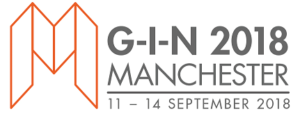News
14th annual G-I-N conference
On 11th till 14th of September 2018, the G-I-N Annual Conference took place in Manchester, UK. This year´s conference was titled: “Why we do what we do: the purpose and impact of guidelines”. The conference was co-hosted by two founder members: NICE (The National Institute for Health and Care Excellence) and SIGN (Scottish Intercollegiate Guidelines Network).
The event was an exciting opportunity for all those who work with guidelines in health and social care to come together. A wide range of issues have been discussed, including the benefits of guidelines for patients and how they can support shared decision-making to address variations in care. It was an exciting opportunity to reflect on what peers are doing in the field of evidence-based practice, what challenges we face in the digital age, and the role that guidelines play in driving and enabling high quality care.
IR-HSCSP presented a poster on a scoping review of systematic reviews of how patients living with chronic conditions value the importance of outcomes for self-management. The aim of the review was to determine what outcomes have a bigger impact on patients’ daily life, how it is living with their condition, patients’ views regarding self-management, and barriers or facilitators for self-management interventions in the four conditions: Type 2 Diabetes, COPD, Heart Failure and Obesity. Based on the review, infographics were developed for our COMPAR-EU COS workshop on prioritisation of patient-important outcomes. The infographics were distributed at the beginning of the discussions as supporting material to clarify concepts or to provide guidance on patients´perspectives as reported in the literature.

Consensus on the most important outcomes
After the first two rounds of COMPAR-EU´s Delphi survey in May and June, a consensus meeting took place on 10th and 11th of July in Berlin, Germany. The first two rounds were only addressed to patients to gain their opinions on the most important outcomes for their respective disease. The purpose was to ensure that outcomes truly reflect patients’ priorities and preferences when it comes to selecting the most important outcomes, called the Core Outcome Set (COS). COS is an agreed standardised set of outcomes that should be measured and reported, as a minimum, in all clinical trials in specific areas of health or health care. In those first two rounds, patients were asked to electronically prioritise relevant outcomes using a Likert scale, ranging from 1 (lowest importance) to 9 (highest importance). In the consensus meeting, 20 patients, carers and their representatives were brought together with further 20 health care professionals, researchers and guideline developers from a diverse range of European institutions and organisations. Four panels (one for each condition: COPD, heart failure, type 2 diabetes, and obesity) were created to discuss and achieve consensus on the final COS to be included in the project. The purpose of this face-to-face meeting in Berlin was to solve potential tension between the perspectives of patients and those of researchers or clinicians, and the challenges that these different perspectives pose for COS development. Click here to read the whole report on the COS workshop in Berlin.
Extraction form design meeting in Barcelona:
On the 12th and 13th of April, we had our second meeting in Barcelona with our consortium partners FAD, EPF, IR-HSCSP, Nivel, UOI and OptiMedis AG. We developed and advanced the design of the data extraction form for the analysis of randomised clinical trials. The involvement of all concerned partners is important to assure that all relevant variables are included in the extraction form. The extraction form is the key instrument to achieve comparison of self-management interventions. Questions like `How to collect information on complex self-management interventions, outcomes and target populations´ were discussed. Three organisations will review more than 4,000 articles, therefore, consistency is crucial.
Kick off meeting in Barcelona
On 11th and 12th of January, we had our kick off meeting of COMPAR-EU in Barcelona. 26 researchers from 7 organisations located in 5 European countries attended the meeting. The project aims to identify, compare, and rank the most effective and cost-effective self-management interventions (SMIs) for adults in Europe suffering from one of the four high-priority chronic conditions: type 2 diabetes, obesity, chronic obstructive pulmonary disease, and heart failure. We will provide support for policy-makers, guideline developers and professionals to make informed decisions on the adoption of the most suitable self-management interventions through an IT platform, featuring decision-making tools adapted to the needs of a wide range of end users (including researchers, patients, and industry). During the meetings we discussed the project plan and advanced our scientific approach. Most exciting about the meeting was the mix of disciplines and research groups, including health services researchers, health economists, mathematicians, business developers and representatives of patient organisations, all working together to ensure patients gain access to effective self-management interventions.



